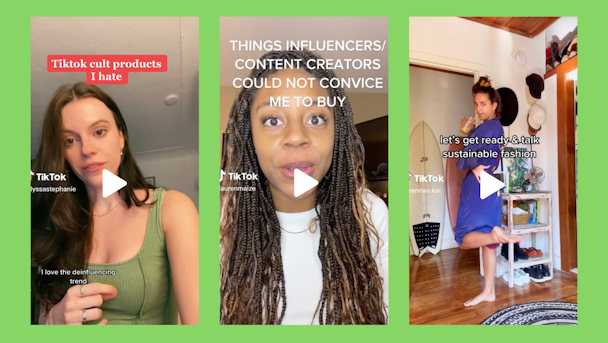Why influencers are a secret weapon for sustainability
From de-influencing to modeling low-carbon lifestyles, agencies, influencers and sustainability experts weigh in on the potential and pitfalls of a creator-led green transition.

75% of people say creator content makes them more likely to adopt sustainable behaviours, say Unilever
Recent research by Unilever has highlighted the sheer horsepower of influencers’ ability to shape behaviors and encourage greener choices – for 78% of people, they have the biggest impact of all media, greater than TV, news and even government campaigns.
More than that, three in four people are more likely to take up behaviors that are good for the environment after watching social media content, while eight in ten (83%) think TikTok and Instagram are good places to get advice about how to live sustainably.
Advertisement
Dove and Hellmann’s – two of Unilever’s largest brands – recently worked with influencers to address the two most impactful behaviors on an individual’s carbon footprint: using less plastic, and wasting less food. As a result, 76% were encouraged to act after watching Dove plastics reuse content and 82% after watching Hellmann’s content on food waste reduction.)
But influencers’ social and cultural capital is extending beyond the realm of deals with purpose-led brands and into new territory.
Advertisement
The recent trend of ‘de-influencing’ has emerged as a way of encouraging more conscious consumption. Initially focussing on highlighting products people shouldn’t buy or showcasing better alternatives, “de-influencing, at its core, is a push for more minimalist principles to become mainstream” explains Brennan Kai, a creator of plant-based and low-impact lifestyle content.
But for those who create content centered around sustainability and minimalism, the concept is nothing new. “It’s simply a rebranding of the principles we’ve been advocating for since day one. Encouraging people to simply take a hard look at their consumption habits and be more mindful in their day-to-day lives is one of the most effective ways to advocate for a livable planet,” she goes on to say.
In this sense, sustainability expert and co-founder of the agency Futerra, Solitaire Townsend says that de-influencing is really a full circle moment for creator-led content.
Suggested newsletters for you
“Most influencers didn’t start out to become a brand or a driver of consumption; they started out because they had something to say, they had a personality and they built a community around that – the paid posts come later.”
In a way, “de-influencing is getting influencers back to where they started,” she adds. But the question they’re increasingly facing is how they will monetize limited consumption in their content “because many of them rely on sponsorship for their living.”
Townsend predicts that influencers will see more budgets come their way from governments and NGOs as they wake up to the effectiveness of creator-led marketing to get their messages out.
For brands looking to maintain their relationships with influencers, this means getting serious about listening to the demands of both creators and their communities.
“The brands that win in this space are those that understand creators are not billboards,” says Nicholas Guy, chief exec and co-founder of sustainable influencer agency No Logo.
“Effective creator marketing requires the relationship between a brand and a creator to be about an authentic partnership, not a form of ownership of digital space. Creators are experts at building communities and they are the experts of these communities; for brands to work effectively with creators, they need to value this expertise.”
Nader Dehdashti, head of creators at Jungle, adds: “Brands should be looking to work with creators with a trusting following, rather than a big following as the level of conversation will be much higher.”
This requires boldness, from brands he says, as they will have “less control over what is said about their product and others in the category but it does offer an authentic link between a creator and their community – they know this creator only speaks the truth.”
However, as brands wake up to the power of influencers in the sustainability space, citizens may fear that creators could be susceptible to unintentional greenwashing, or that their influence could be bought by high-carbon brands.
But Guy dismisses those concerns. “Like brands, top creators have a clear set of values or guidelines that brands they decide to partner with need to meet. From the creator’s perspective, this can be a helpful tool to help guide decisions about brand partnerships. Creators that say no to brands that don’t align with their values often build trust within their communities; authenticity creates credibility.”
While Townsend adds, “follower relationships and communities are absolutely crucial, and they’re going to have to be very picky about the brands they partner with.”
She believes brands will start to see influencers become increasingly sophisticated in their demands – thanks, in part, to work she recently carried out with YouTube and 50 of their top creators, (“collectively, they have the combined reach of 1bn”) developing their voice on discussing climate change and advising them on working with sustainable brands. “Influencers are effectively members of the public, they might not have a legal department or sustainability team to steer them, but with training, these brands are going to be asking harder, and more specific, more professional questions of the brands they work with.”
Whether we see this kind of platform-led education for influencers rolled out across other platforms remains to be, but Townsend concludes she is increasingly eager for strong measurement to be developed on the impact of influencers in shaping sustainable habits,
“Hopefully, this will see positive, informed relationships between influencers, brands and governments and NGOs – those seeking to affect culture to align with the IPCC findings – and perhaps a little bit of a harder time for the brands who aren’t…”

